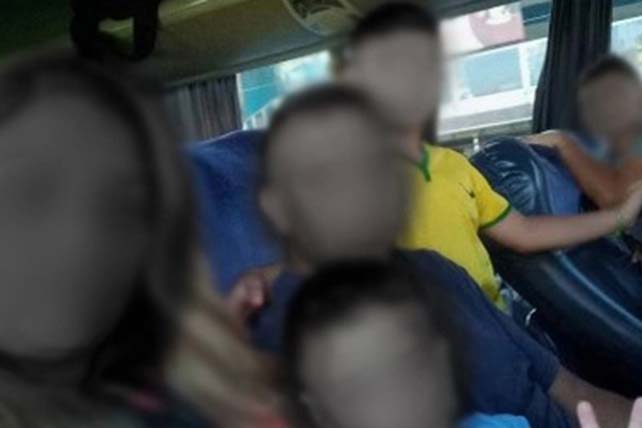TAYLORSVILLE, Ga. (BP) — Like others in Kabul, M grew concerned about rumbles of the Taliban’s return in the summer of 2021. The married father spoke with others and monitored reports while committing to his work for an international business.
His concern reached a different level the day he heard U.S. troops were leaving. The existing Afghan government and encroaching Taliban said they had agreed upon mutually beneficial ways of leadership.
M knew it was a lie.
“My family took nothing, just the clothes we wore,” he said of their decision to leave.
Their journey began that day with an anxious eight-hour wait aboard a Pakistan Air jet at the Kabul airport before departure. It ended more than 14 months later in northwest Georgia through the work of several Christians, including Southern Baptists.
In between were stays in Pakistan and Brazil, then a two-month journey to the U.S.-Mexico border that included dangers from weather, animals and people. During that time, they clung to each other and their Christian faith.
“We loved our lives in Kabul,” M said. “Our family went out to eat. We went to the park. Our children loved their school.”
RELATED: Afghanistan Christians in Hiding, Denied Aid Year After U.S. Withdrawal
Those were left behind one day before Taliban forces began spreading through the city. The family made it to the airport and saw firsthand as panic began to set in. Their plane was supposed to take off at 11 a.m., but the chaos delayed the fueling process and they didn’t take off until 7 p.m.
They consider themselves blessed, as one of the first groups to have made it out. The following weeks in Pakistan were tough, though. Many in Islamabad didn’t want the refugees there.
M’s company helped with logistics and finding them a place to stay. They flew across the world to Colombo, a city near the southern coast of Brazil.
While their experience in Brazil was difficult, M said it did not reflect on the country itself. Instead, a language barrier isolated the family. M is fluent in English, with his wife and oldest child familiar with it, but not at his level. Finding other English-speakers in their city proved challenging.
He watched his children struggle with school and making friends. His wife became ill and started to slip into depression. It became apparent that if you couldn’t understand Portuguese, people would take advantage of you.
That brought a decision to leave for America. The family traveled by bus, boat and up to four hours of walking at a time. They slept in two tents and stayed alert to dangers such as thieves and animals. Big cats and poisonous snakes remained a threat. They witnessed monkeys steal items from other refugees.
The two-month journey ended at the U.S.-Mexico border in Tijuana on Oct. 29. M had stayed in contact with his work colleagues along the way. They, in turn, reached Holly Holder of Adairsville, Ga.
RELATED: 2022 World Watch List: Afghanistan Is Now More Dangerous for Christians Than North Korea
Holder, a member of the nondenominational NorthPointe Church, previously worked in Afghanistan. She had been active in the refugee response and reached out to Mandi Cullifer, a member of Cartersville (Ga.) First Baptist Church. Cullifer became aware of the family’s situation as they traveled through Mexico.
Holder and her husband, Scott, spoke at CFBC in the spring of 2022 about the refugee ministry just after Cullifer had stepped away from a 19-year teaching career.
“I casually told Holly that I’d left my job and if she needed any help, I was happy to do so,” Cullifer said. “Two days later she called me and said the first Afghan couple was arriving in Atlanta that evening.”
M’s family would be the sixth of seven that Cullifer helped resettle in Georgia last year. Before arriving in Atlanta, though, the family had to experience the hardest part of the journey.
“After getting picked up by border patrol, I gave them the documents I’d protected the entire time,” he said. “We were placed in – I guess you would call them cells – for 24 hours while they processed us. I was by myself and the others scattered in different ones. We couldn’t see each other from where we were.”

